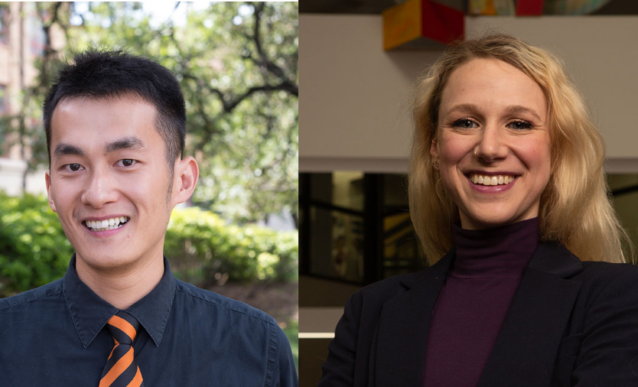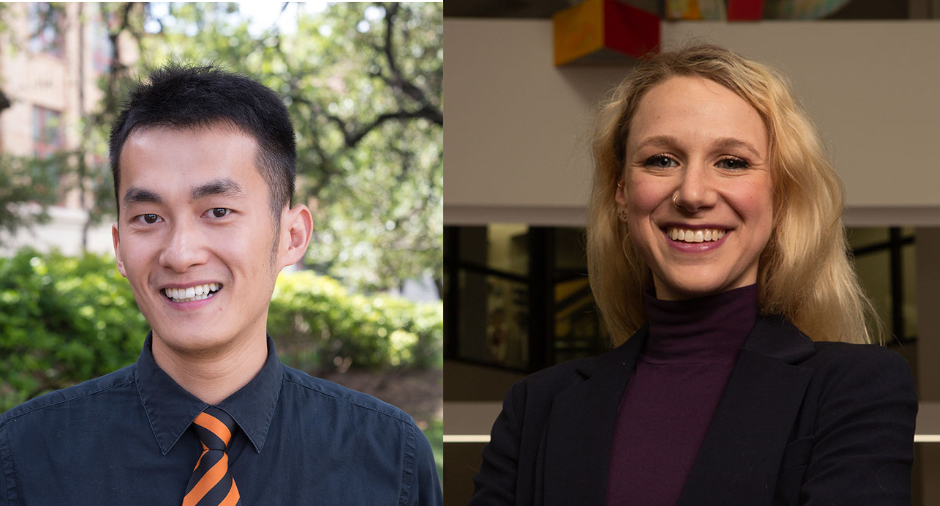Member Spotlight: Anao Zhang & Nina Jackson Levin

This month our Member Spotlight shines on two of our incredible School of Social Work members, who have collaborated on several significant projects together;
- Dr. Anao Zhang, assistant professor of social work and clinical research director of the Adolescents and Young Adults (AYA) Oncology Program at Michigan Medicine
- Nina Jackson Levin, National Cancer Institute T32 Research Fellow at Rogel Cancer Center.
Zhang is a health and mental health intervention researcher with a primary research interest in psycho-oncology and adolescent & young adult cancer survivorship. An intervention researcher, Zhang contextualizes his work using the social determinants of youth health framework, aiming to develop and deliver integrated and empirically supported mental health treatment to individuals with co-morbid physical and mental health condition. Zhang is also an applied quantitative methodologist who uses advanced statistical methods to support his research, including meta-analysis, structural equation modeling, analyzing experimental data, causal inference and machine learning. Zhang serves as an associate editor for the Journal of Psychosocial Oncology, and the deputy chair of survivorship SIG at the International Psycho-Oncology Society.
Zhang is a licensed clinical social worker, a member of the Academy of Certified Social Workers, and a diplomate of the Academy of Cognitive Therapy with five+ years of clinical experience in hospital settings, specializing in solution-focused brief therapy & cognitive behavioral therapy. Zhang’s teaching interests include advanced clinical social work practice, clinical social work practice in integrated healthcare, inter-professional education, and advanced quantitative methods in social work research. Zhang received his PhD from the University of Texas at Austin where he also completed the graduate portfolio program in Applied Statistical Modeling. Zhang received his MSW from the University of Pennsylvania.
Nina Jackson Levin is a National Cancer Institute T32 Research Fellow in Rogel Cancer Center, trained in Social Work and Anthropology. Jackson Levin’s research focuses on adolescent and young adult (AYA) psycho-oncology, oncofertility, and sexual and gender minority (SGM) health outcomes.
Jackson Levin recently defended her dissertation on, “Meta/Static Ethnography of Adolescent and Young Adult Oncofertility Research and Practice at a United States Hospital: Implications for Sexual and Gender Minorities”. Jackson Levin received her BA, MSW and PhD from the University of Michigan.
- Tell us a bit more about the details of your current research/projects
We are currently leading three projects that have implications for the broader field of precision health, and the three projects are representative of three unique approaches we engage in precision health related work in psychosocial oncology.
- A Rogel Cancer Center funded grant to study the clinical utility of an artificial intelligence (AI) enabled distress monitoring mobile app for adolescents and young adults (AYAs) with cancer. AYA cancer patients’ psychological distress often fluctuates overtime during their cancer journey, and it is critical to continuously monitoring their distress trajectory to ensure timely intervention. However, classic screening methods, e.g., paper-and-pencil or electronic measure, are often one-time effort and can easily cause measurement fatigue. In this study, we are investigating the clinical utility of an AI mobile app that has major potentials to reconceptualize the delivery of distress monitoring and to generate patient-specific data trajectory.
- A project is funded by the Patient-Centered Outcomes Research Institute (PCORI) to better understand the reasons of service non-participation among underrepresented AYAs with cancer. For this project, we define underrepresented AYA cancer patients as individuals self-identify as part of the BIPOC and/or sexual and gender minority (SGM) community. Instead of asserting reasons for service disparity among BIPOC and/or SGM AYA cancer patients, the focus of this project is to learn from and work with these patients to better understand disparity-related factors, a different way to approach precision health, if you may.
- A study is similar in spirit to the PCORI project, exploring the needs of a vulnerable patient population: SGM AYAs facing potential treatment-related infertility and requiring oncofertility services. Funded by U-M Institute for Research on Women & Gender, the study is titled “Queering Oncofertility”: Exploring fertility preservation and sexual health counseling for queer adolescents and young adults with cancer” (PI: Emily Walling; Co-PI: Jackson Levin; Co-I: Zhang). This exploratory, mixed-methods investigation aims to identify potential areas of oncofertility service delivery that may be tailorable to the precise sexual and reproductive health needs of SGM AYAs.
- What is innovative/new/exciting about these projects?
There are several exciting aspects of the three projects, and we want to highlight one thing in the PCORI project. In cancer control and population sciences, patient-centered research is highly valued, but the engagement of patient voices has been highly variable across different projects. What’s particularly unique and innovative about the PCORI project is that we have an advisory panel of ten BIPOC and/or SGM AYA cancer patients who guide the entire project, such as the design of study flyers, recruitment strategies, interview questions, and dissemination plan, to name a few. By using such a design, we hope to maximize patient voices in understanding their needs and the challenges they face. This may sound like something easy to do, but often very difficult to achieve.
- What is the anticipated outcome of this research?
The anticipated outcome of the AI distress study is to obtain a clinical tool, powered by advanced technology, that has proven utility and clinical value in the day-to-day care for AYAs with cancer. The anticipated outcome for the PCORI study is to develop an in-depth understanding of the reasons, i.e., barriers, that exclude or prevent underrepresented AYA cancer patients from meaningfully engaging in clinical and supportive cancer care. The anticipated outcome of the “Queering Oncofertility” study is to identify areas of oncofertility practice that would benefit SGM patients by adapting to meet diverse sexual and reproductive health needs.
- How it will benefit patients and clinicians?
Pediatric and medical oncologists serving AYAs will benefit from all studies. For the AI study, the evaluated clinical tool has the potential to remove distress screening from busy oncology care schedules to a patient’s preferred time and location for completion. This will not only reduce oncologist and provider burden but also promote patient autonomy in self-monitoring psychological distress. For the PCORI project, the anticipated findings will provide valuable insight for AYA oncology providers to be more inclusive and equitable care to underrepresented AYAs with cancer. We will also invite participants and the advisory panel members to discuss strategies to further promote inclusivity and health equity, which will benefit both providers and patients. For the “Queering Oncofertility” project, clinicians will benefit from developing more acute awareness about SGM AYA specific experiences so they may provide tailored service delivery that meets their patients’ needs.
- How is Precision Health is supporting this research?
We are grateful for the opportunity to share our research with a large group of colleagues who are also interested in precision health. We look forward to establishing potential collaborations and further conversations to advance the wellness for AYAs living with a cancer diagnosis.
- What are your research interests, broadly?
As psycho-oncology researchers, we are both interested in the broad field of AYA oncology, with a specific focus on health equity and inclusivity.
- Anao: developing, evaluating, and disseminating theoretically and/or technologically innovative intervention methods to advance the psychosocial wellness of AYA cancer patients and survivors.
- Nina: sexual and gender minorities, adolescents, and young adults, oncofertility, assisted reproductive technologies, survivorship, medical anthropology, ethnographic methods
- How does your work apply to the field of precision health?
As social and behavioral health scientists, we are interested in the clinical utility of advanced technologies in improving the clinical care of AYA cancer patients. For example, we are interested in validating machine learning algorithm originally trained in a healthy population among individuals with cancer.
Both of us are PhD-level social work researchers and, not surprising, attention to disparity and social injustice are at the center of our scholarly investigations. Both of us are keenly interested in understanding the unique healthcare needs of minority AYA cancer patients, especially how their needs may be similar to or different from AYAs who are not part of the BIPOC and/or SGM community.
What do you like to do when you aren’t doing research?
- Anao: I am a very new tennis player/learner, so when weather allows, I try to play tennis.
- Nina: When not at my desk I can be found doing a puzzle with my fiancé while listening to a podcast on scams or scandals; or taking our dogs on a hike – preferably near a body of water.
If you’d like, please provide links to recent/significant work.
- https://www.mdpi.com/2072-6694/14/4/914
- https://www.ncbi.nlm.nih.gov/pmc/articles/PMC10172720/
- https://pubmed.ncbi.nlm.nih.gov/33960845/
- https://www.pcori.org/research-results/2022/partnering-advance-psycho-oncology-services-underrepresented-adolescents-and-young-adults-cancer
- https://pubmed.ncbi.nlm.nih.gov/36603107/
- https://connect.springerpub.com/content/sgrlgbtq/3/2/111


